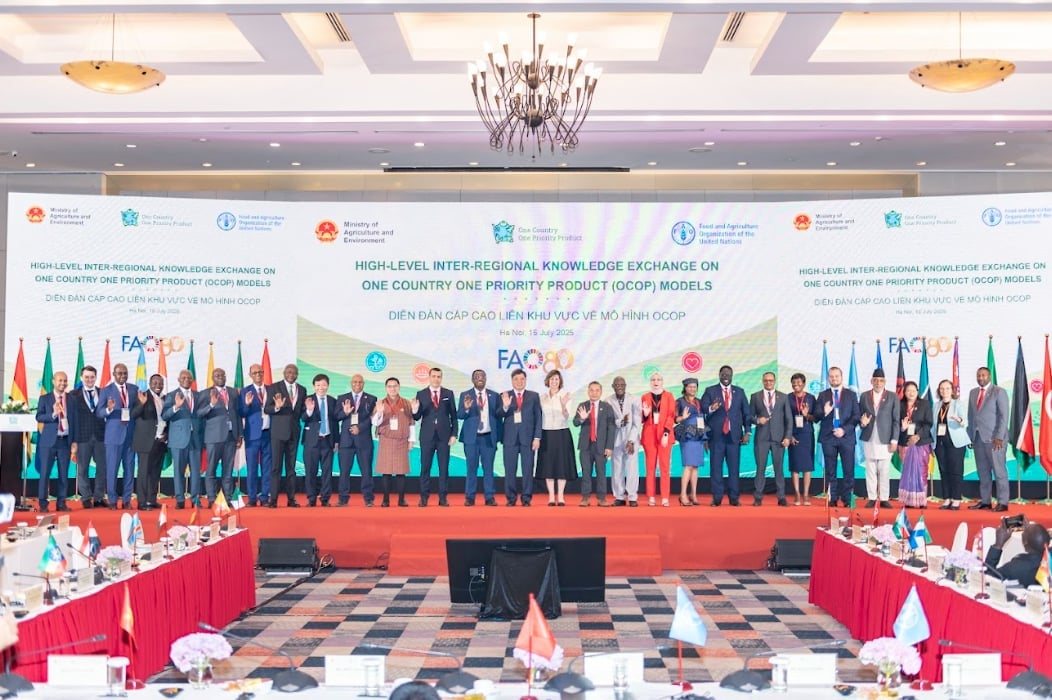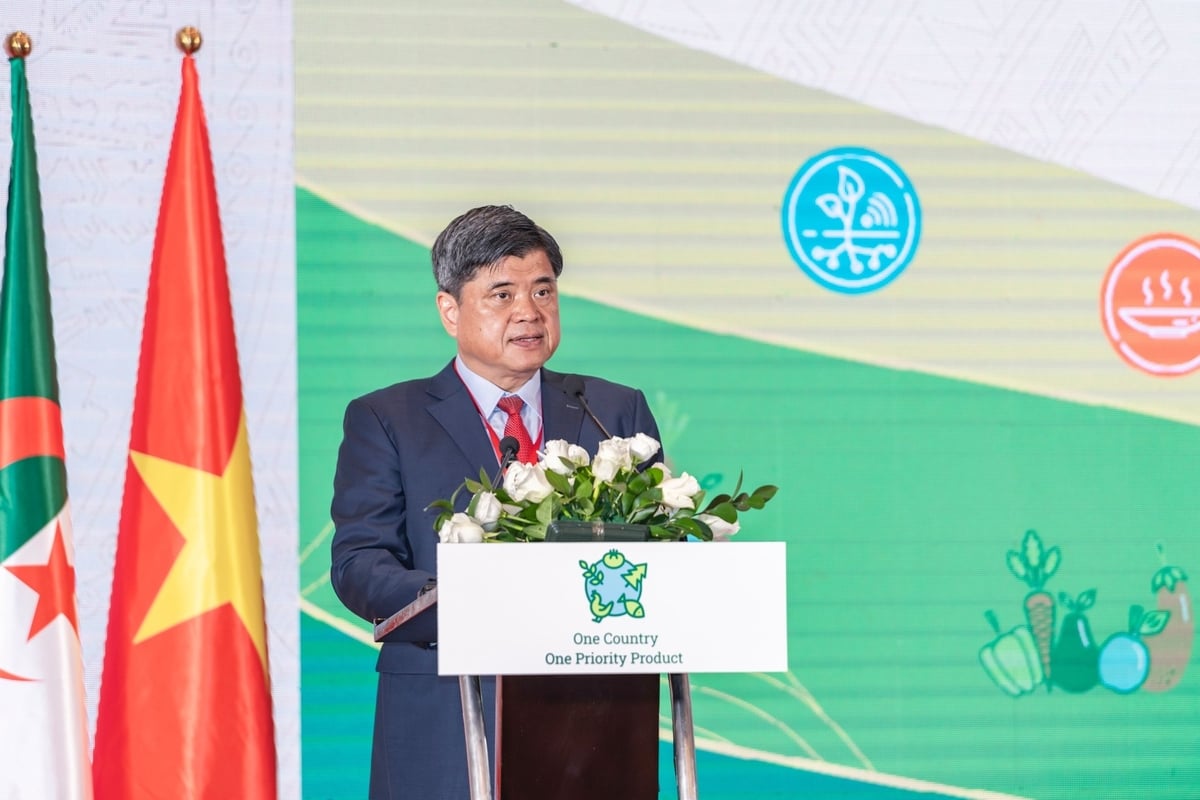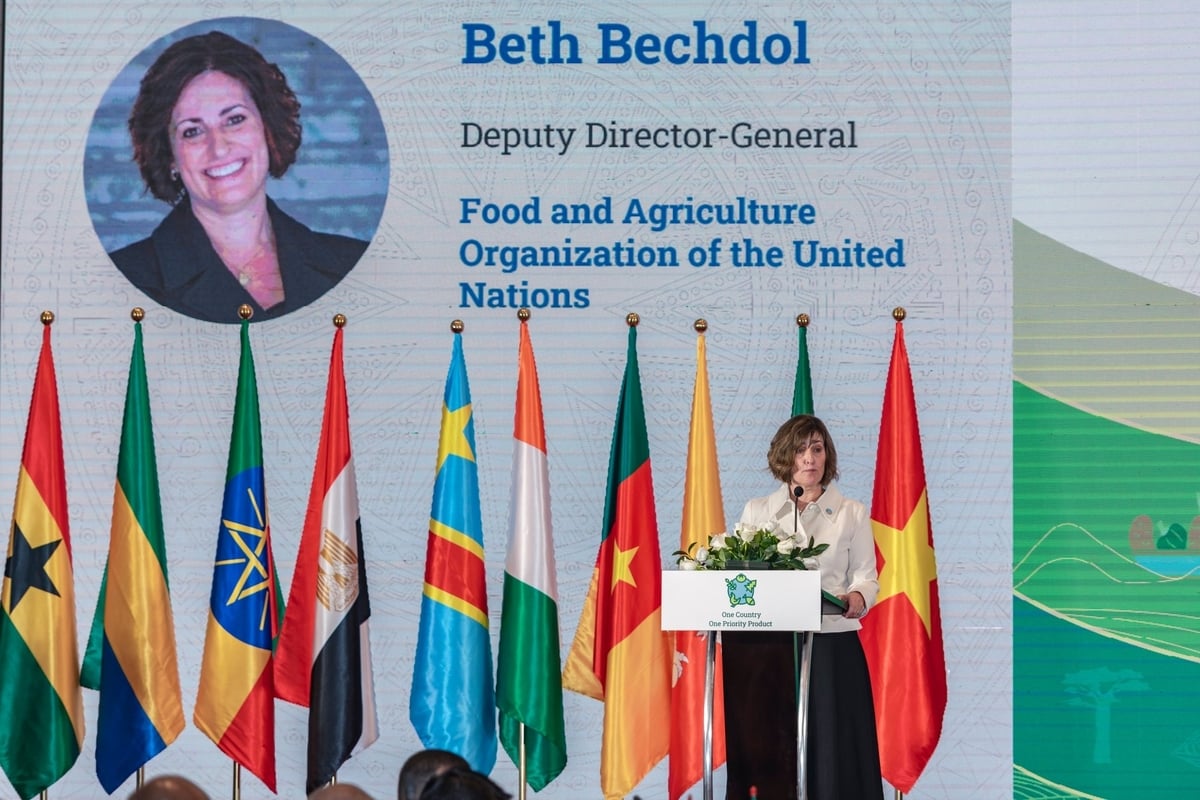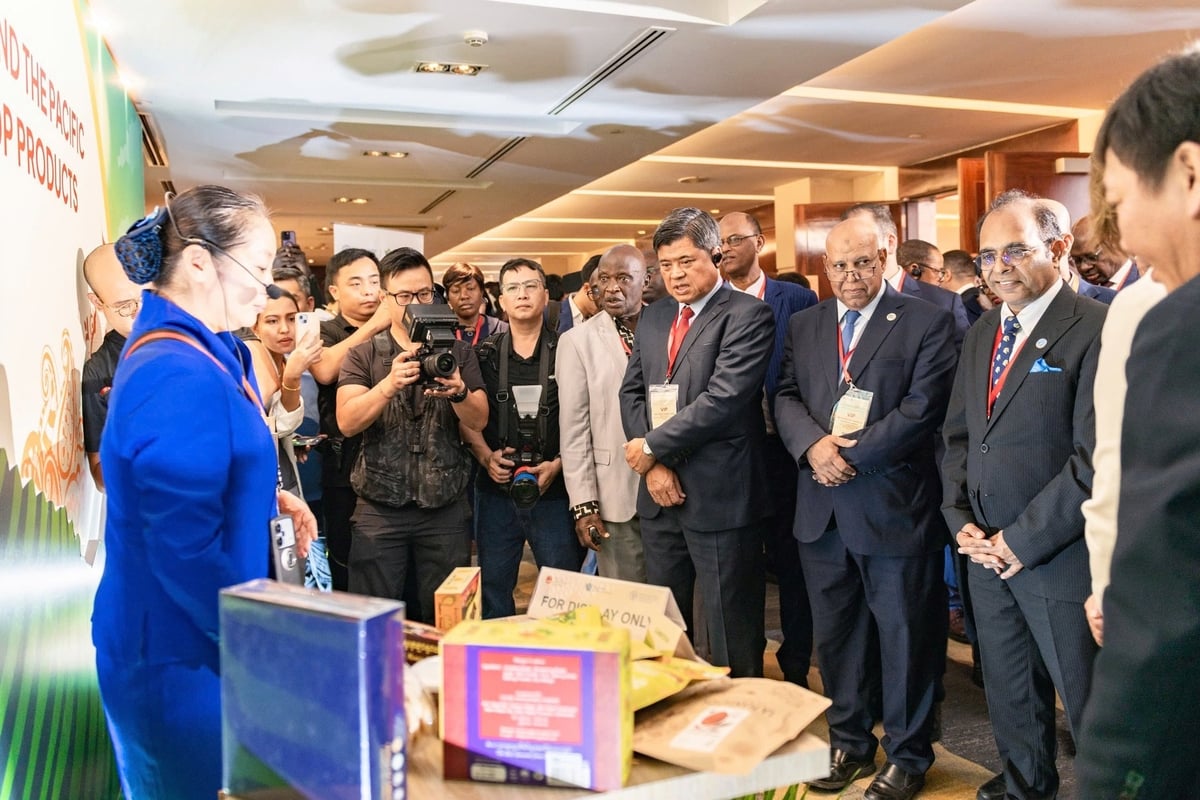December 31, 2025 | 23:22 GMT +7
December 31, 2025 | 23:22 GMT +7
Hotline: 0913.378.918
December 31, 2025 | 23:22 GMT +7
Hotline: 0913.378.918
On July 15, the Ministry of Agriculture and Environment, in collaboration with the Food and Agriculture Organization of the United Nations (FAO), organized the High-Level Inter-regional Knowledge Exchange on One Country One Priority Product (OCOP) Models.
The event was attended by Ministers of Agriculture and senior officials from Bhutan, Cameroon, Côte d'Ivoire, the Democratic Republic of the Congo, Gabon, Ghana, Ethiopia, Lesotho, Malawi, Mozambique, Nepal, Sierra Leone, South Sudan, Tunisia, Vietnam, Zambia, and Zimbabwe.

The High-Level Inter-regional Knowledge Exchange on OCOP models took place on July 15 in Hanoi. Photo: Tran Van.
In his opening remarks, Deputy Minister of Agriculture and Environment Tran Thanh Nam emphasized: "Today’s forum is a concrete outcome of an initiative by FAO Director-General Qu Dongyu, which was proposed during his visit to Vietnam in February 2025."
This initiative has connected global and regional efforts to enhance the implementation of Vietnam’s OCOP program and FAO’s Global OCOP Initiative, which aims to achieve the 'Four Betters': better production, better nutrition, a better environment, and a better life.
According the Ministry of Agriculture and Environment, Vietnam’s vision for OCOP is to build a sustainable, competitive, and inclusive value chain that improves people's income and quality of life. OCOP is not merely a brand; it is an integrated model involving the government, enterprises, cooperatives, and communities within an innovation ecosystem focused on capacity building, quality control, branding, and market connectivity.

Deputy Minister of Agriculture and Environment Tran Thanh Nam delivers the opening remarks at the forum. Photo: Tran Van.
Drawing from over seven years of implementation, Vietnam’s OCOP program has not only contributed to realizing the 'Four Betters' goals but has also helped identify and promote strategic products specific to each locality and country. This has been done with respect for cultural identity, sustainable resource utilization, and a strong orientation toward global market access.
Deputy Minister Tran Thanh Nam emphasized the importance of establishing networks and mechanisms for information sharing, particularly in terms of policies, technologies, and markets, among countries to support the sustainable development of OCOP products.
"To collectively advance the OCOP program in alignment with FAO’s 'Four Betters' vision, countries in the Global South need to strengthen cooperation in training and capacity building for managers, cooperatives, and small and medium-sized rural enterprises. Special attention should be given to vulnerable groups such as women, the elderly, people with disabilities, and ethnic minorities," he noted."In addition, I encourage the piloting of public-private-community partnerships to mobilize financial, technical, and indigenous knowledge resources to support rural development and enhance the value of OCOP products," Mr. Nam added.
According to Ms. Beth Bechdol, Deputy Director-General of FAO, Vietnam is a dynamic country that plays an active role in global efforts toward sustainable agricultural transformation."This is the first-ever knowledge exchange event between African countries and Vietnam, highlighting Vietnam as a bright spot in agricultural development and international cooperation," she affirmed.
Ms. Beth Bechdol also emphasized the importance of building and sharing experiences among countries and across regions, particularly as African and Asian nations face similar challenges in agricultural development.

Ms. Beth Bechdol, Deputy Director-General of FAO, speaks about the significance of the OCOP initiative at the forum. Photo: Tran Van.
Ms. Bechdol highly appreciates the OCOP initiative implemented in Vietnam since 2018. This initiative aims to promote local agricultural products that have yet to reach their full potential and integrate them into a modern agricultural value chain.
She emphasized that OCOP is not only a driver of local economic development but also a foundation for a sustainable agricultural growth strategy. Diversifying products, enhancing resilience, and fostering knowledge sharing among countries are key for Asia and Africa to act together and move forward collectively.
In the Asia-Pacific region, FAO offices are actively supporting the promotion of OCOP products, building local capacities, and bringing distinctive agricultural products to global markets. "We can affirm that OCOP is gradually becoming a strategic pillar in rural economic development in the region," Ms. Beth Bechdol reiterated.
Through the One Country One Priority Product (OCOP) international initiative, the FAO is supporting the development of 56 distinctive agricultural products, contributing to improving livelihoods and promoting the potential, advantages, and cultural values of each locality.
“We are committed to continuing support for African countries in the fight against hunger and malnutrition. Through trilateral cooperation, we can transform challenges in Africa into development opportunities and jointly build a green, transparent, and sustainable food network,” emphasized FAO Director-General Qu Dongyu in a video message.

Deputy Minister Tran Thanh Nam and leaders of Agriculture Ministries from Africa and Asia visit the OCOP exhibition booth at the Inter-regional High-Level Forum. Photo: Tran Van.
FAO is actively collaborating with leading science and innovation centers in the Asia-Pacific region to strengthen the value chains of Special Agricultural Products (SAP), thereby supporting the “Four Betters” goals. A key outcome of this cooperation is the implementation of a pioneering geographic and environmental traceability tool aimed at promoting sustainable SAP production.
At the same time, nutritional science and technology are aiding the development of SAP food products tailored to diverse age groups and preferences. Additionally, market information is helping Asia-Pacific countries integrate SAP into formal international markets.
Translated by Phuong Linh

(VAN) Located in three former provinces, Nam Dinh, Thai Binh, and Ninh Binh, and now in two provinces, Ninh Binh and Hung Yen, "Red River Delta" is the name of Vietnam's first interprovincial coastal wetland World Biosphere Reserve.
/2025/12/29/1046-1-210728_624.jpg)
(VAN) In 2025, Viet Nam recorded severe and extreme disasters, breaking multiple historical records and causing heavy losses in lives, property, and infrastructure nationwide.

(VAN) Applied technologies, water-saving irrigation is a strategic solution to promote climate-resilient agriculture and strengthen water security in the uplands.
/2025/12/29/3936-3-163422_251.jpg)
(VAN) Can Gio mangrove forest in particular and the entire Can Gio Mangrove Biosphere Reserve in general hold great potential for carbon credits.

(VAN) Chu Pah Rubber has announced its products that comply with the EU Deforestation Regulation (EUDR), affirming its commitment to sustainable production and product origin transparency.

(VAN) Deputy Director Nguyen Hoai Nam stated that a digital data platform will be developed with agricultural sector databases, utilizing AI to help farmers make informed decisions on 'watering correctly, sufficiently, and efficiently.’
/2025/12/29/4841-2-134224_777.jpg)
(VAN) From only about 10 individuals in 2009, the wild elephant population in Dong Nai has recovered to nearly 30 animals after more than 10 years.